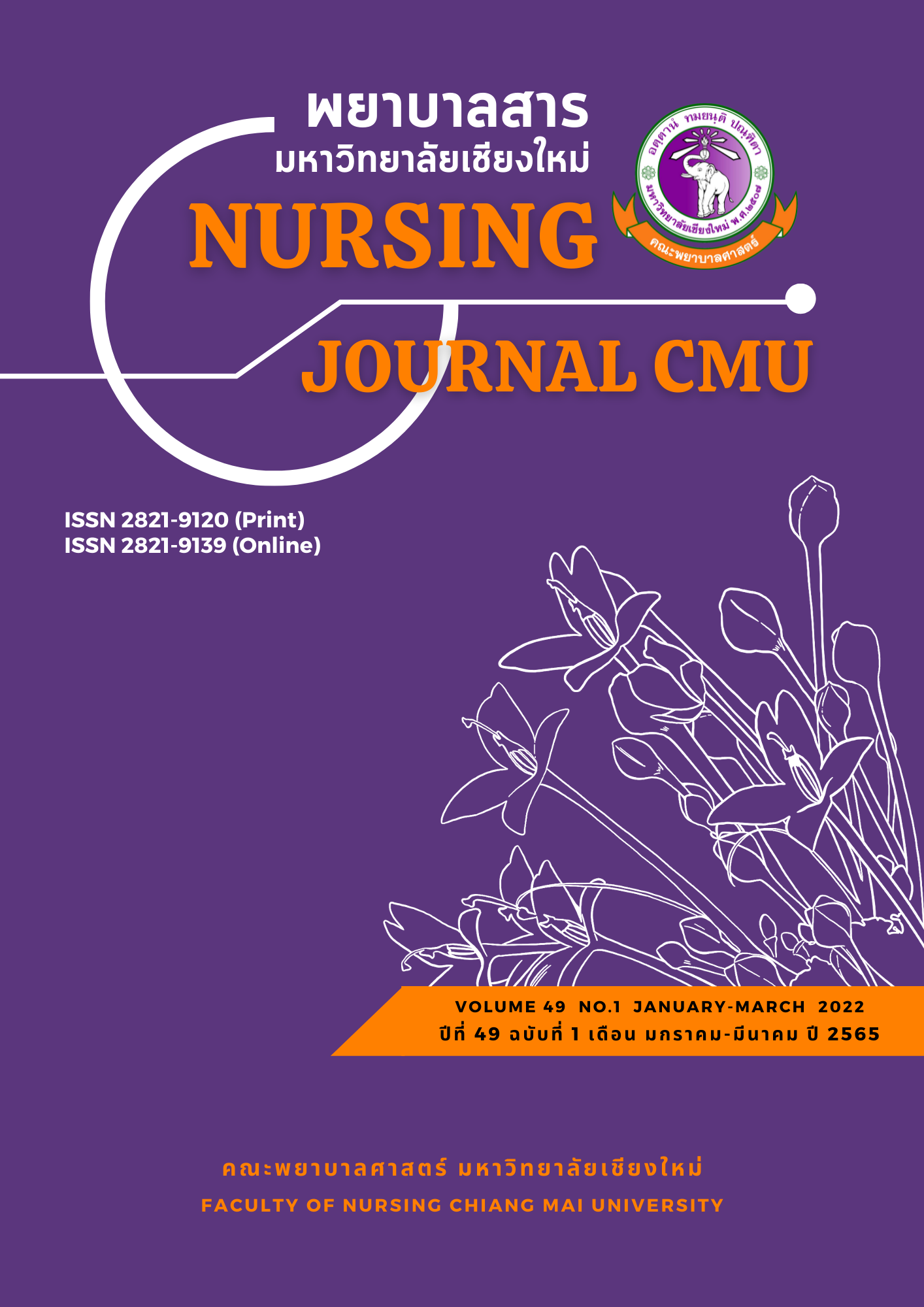Emotional Intelligence and Job Performance of Nurses in Tertiary Hospitals of Xishuangbanna City, the People’s Republic of China
Keywords:
Emotional intelligence, Job performance, Nurse, Tertiary hospitalAbstract
Emotional intelligence is an important ability for improving job performance. This correlational study aimed to explore levels of emotional intelligence and job performance, as well as the relationships between the two, among nurses in tertiary hospitals in Xishuangbanna City, the People’s Republic
of China. The sample included 296 nurses working in two tertiary hospitals in Xishuangbanna City. Research instruments were the Wong and Law Emotional Intelligence Scale (WLEIS) (Wong & Law, 2002) and the Shortened Job Performance Scale (SJPS) (Greenslade, 2008) translated into Chinese by Lin (2012). The Cronbach’s alpha coefficients were .94 and .92. The data were analyzed with descriptive statistics and Pearson’s Product-Moment correlation.
The results of this study were as follows:
1. The mean score of overall emotional intelligence was at a moderate level ("X" ̅ =4.91, SD=0.84). In terms of each dimension of emotional intelligence, Self-Emotion Appraisal (SEA) was at a high level
("X" ̅ =5.61, SD=0.87), while Others’ Emotion Appraisal (OEA), Regulation of Emotion in the self (ROE), and Use of Emotion to facilitate performance (UOE) were at moderate levels ("X" ̅ =4.55, SD=1.19; "X" ̅ =4.58, SD=1.20; "X" ̅ =4.90, SD=1.11).
2. The mean scores of task performance and contextual performance were at a moderate level ("X" ̅ =54.39, SD=10.57; "X" ̅ =67.54, SD=12.12).
3.There were significant positive relationships between emotional intelligence and task perfor- mance (r = .456, p<0.01) as well as emotional intelligence and contextual performance (r =.432, p<0.01).
Nursing administrators could develop strategies to improve nurses’ emotional intelligence skills, enhancing overall work performance.
References
Altuntas, S., & Baykal, U. (2010). Relationship between nurses’ organizational trust levels and their organizational citizenship behaviors. Journal of Nursing Scholarship, 42(2), 186-194.
Bai, K. (2018). Social support and job performance of ICU nurses in tertiary hospitals of Kunming, The People’s Republic of China (Unpublished master’s thesis). Chiang Mai University, Thailand.
Burns, N., & Grove, S. K. (2009). The practice of nursing research conduct, critique, and utilization. Philadelphia: W.B. Saunders.
Cao, X., Chen, L., Tian, L., Diao, Y., & Hu, X. (2015). Effect of professional self concept on burnout among community health nurses in Chengdu, China: The mediator role of organisational commitment. Journal of Clinical Nursing, 24(19-20), 2907-2915.
Fernández-Castro, J., Martínez-Zaragoza, F., Rovira, T., Edo, S., Solanes-Puchol, Á., Martín-del-Río, B., . . . Doval, E. (2017). How does emotional exhaustion influence work stress? Relationships between stressor appraisals, hedonic tone, and fatigue in nurses’ daily tasks: A longitudinal cohort study. International Journal of Nursing Studies, 75(2), 43-50.
Greenglass, E. R., Burke, R. J., & Fiksenbaum, L. (2001). Workload and burnout in nurses. Journal of Community & Applied Social Psychology, 11(3), 211-215.
Greenslade, J. H. (2008). Organisational factors impacting on patient satisfaction: An examination of service climate, effort, and performance (Unpublished doctoral dissertation). School of psychology, the University of Queensland, Australia.
Greenslade, J. H., & Jimmieson, N. L. (2007). Distinguishing between task and contextual performance for nurses: Development of a job performance scale. Journal of Advanced Nursing, 58(6), 602-611.
Hogg, R. V., & Craig, A. T. (1995). Introduction to mathematical statistics (5th ed.). Upper Saddle River, NJ: Prentice-Hall.
Joseph, D. L., & Newman, D. A. (2010). Emotional intelligence: An integrative meta-analysis and cascading model. Journal of Applied Psychology, 95(1), 54.
Lan, M. J., Zhao, R. W., & Yang, Y. (2007). Study for the effects of nurse extended working hours on daily fatigue and job satisfaction. Journal of Nurses Training, 24(1), 2214-2216.
Law, K., Wong, C., Huang, G., & Li, X. (2008). The effects of emotional intelligence on job performance and life satisfaction for the research and development scientists in China. Asia Pacific Journal of Management, 25(1), 51-69. doi:10.1007/s10490-007-9062-3
Lee, J. L., Chang, B. L., Pearson, M. L., Kahn, K. L., & Rubenstein, L. V. (1999). Do what nurses do affect clinical outcomes for hospitalized patients? A review of the literature. Health Services Research, 34(5), 1011.
Lin, K. (2012). Fatigue and job performance among nurses in tertiary hospitals, Yunnan Province, The People’s Republic of China (Unpublished master’s thesis). Chiang Mai University, Thailand.
Ling Z., Petsunee T., &Bunpitcha C., (2019). Perceived leader-member exchange and patient safety culture among nurses in tertiary hospitals, Kunming, the People’s Republic of China. Nursing Journal, 46(2), 210-223.
Praveen, R. N. T., & Narashiman, K. (2013). Emotional intelligence and work performance: A conceptual study. Journal of Mechanical and Civil Engineering, 2013(1), 62-68.
Qiao, G. H, & Wang, J. N. (2010). Survey on job satisfaction, career development and organizational support among nurses. Journal of Nursing Science, 25(3), 52-54.
Salovey, P., & Mayer, J. D. (1990). Emotional intelligence. Imagination Cognition and Personality, 9(3), 185-211.
Schwirian, P. M. (1978). Evaluating the performance of nurses: A multidimensional approach. Nursing Research, 27(6), 347-351.
Wong, C. S., & Law, K. S. (2002). The effects of leader and follower emotional intelligence on performance and attitude: An exploratory study. The Leadership Quarterly, 13(3), 243-274.
Wilaiporn N., Pacharawan K., Lawan S., Chompoo B., Sukanya M., (2018). Effect of emotional quotient promoting program on emotional quotient among nursing students. Nursing Journal, 45(1), 110-121.
Yamane, T. (1973). Statistics: An introductory analysis. New York: Harper and Row.
Downloads
Published
How to Cite
Issue
Section
License
Copyright (c) 2022 Nursing Journal

This work is licensed under a Creative Commons Attribution-NonCommercial-NoDerivatives 4.0 International License.
บทความที่ได้รับการตีพิมพ์เป็นลิขสิทธิ์ของวารสารพยาบาลสาร
ข้อความที่ปรากฏในบทความแต่ละเรื่องในวารสารวิชาการเล่มนี้เป็นความคิดเห็นส่วนตัวของผู้เขียนแต่ละท่านไม่เกี่ยวข้องกับมหาวิทยาลัยเชียงใหม่ และคณาจารย์ท่านอื่นๆในมหาวิทยาลัยฯ แต่อย่างใด ความรับผิดชอบองค์ประกอบทั้งหมดของบทความแต่ละเรื่องเป็นของผู้เขียนแต่ละท่าน หากมีความผิดพลาดใด ๆ ผู้เขียนแต่ละท่านจะรับผิดชอบบทความของตนเองแต่ผู้เดียว






